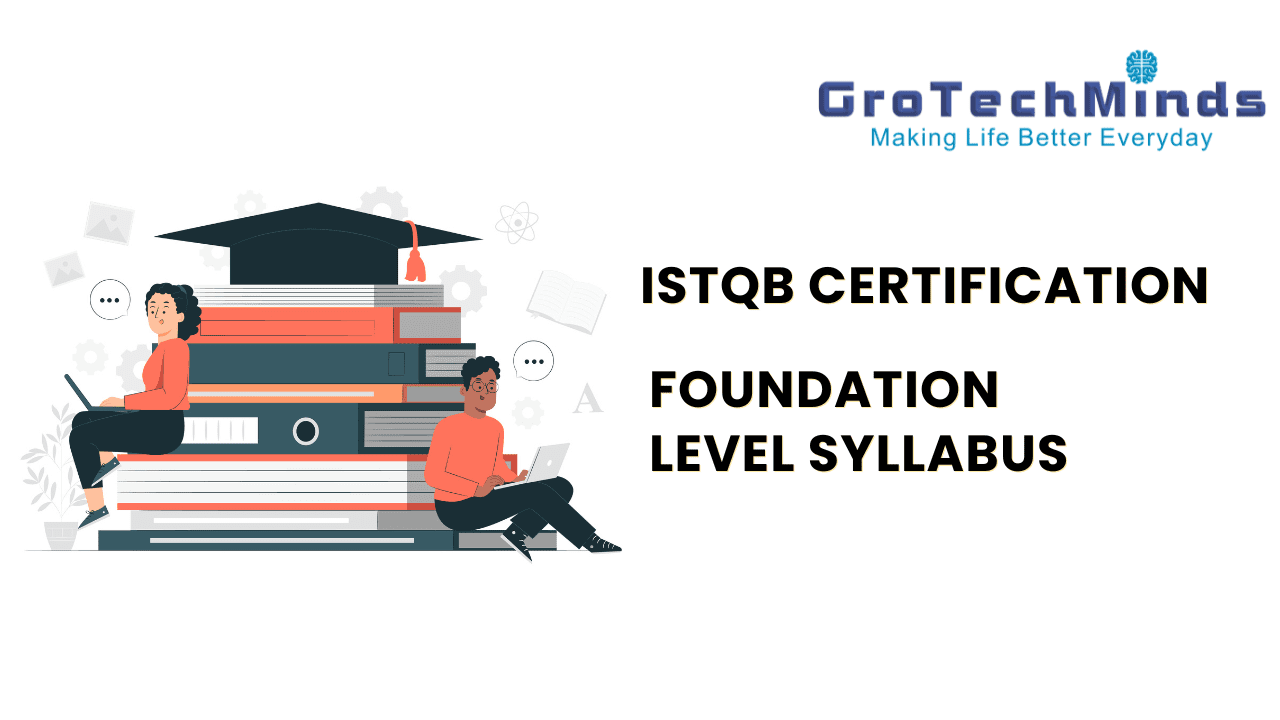ISTQB Foundation Level Certification Syllabus
Introduction
International Software Testing Qualifications Board(ISTQB) is a globally recognised organisation which conducts certification courses and exams for software testers. ISTQB certified testers have a better chance of getting a job in software testing as well as higher chance of job promotion in an organisation. ISTQB certification ensures that the person has thorough knowledge regarding all the concepts related to software testing like test plan, test automation, test case design techniques. To get the ISTQB certificate, an exam is held.The exam aims at testing the knowledge of the candidate regarding all the concepts related to the ISTQB course. After successfully clearing the exam, the candidate can get the ISTQB certificate.
Who can take up ISTQB Certification
The ISTQB Certification course can be opted by people from all streams who want to pursue a career in the Software Testing field.Some of the positions in the software testing field are test engineers, test lead, test manager and Software Development Engineer(SDET) in Testing and with ISTQB Certification, people have better chance of getting recruited in these posts. This course can also be taken up by those people who want to have a proper understanding of the fundamental concepts of Software Testing, like product managers, design architects, business analyst, Quality Engineers, IT Directors and Management Consultants.Software Testers working in an organisation who are looking for job promotion can also take up ISTQB Certification course which can be immensely beneficial for them and result in growth of the organisation in which they are working. With the help of ISTQB Foundation level course certificate, software testers can proceed with the advance level of ISTQB courses like Specialists and other Expert Level Certifications.
Key Concepts
ISTQB concepts are arranged in a systematic way from the basic to the advanced level in order to ensure that the people opting for the ISTQB course can understand all the testing concepts easily and thoroughly.
The ISTQB concepts have been divided into 6 chapters which are as follows
- Fundamentals of Testing
- What is Testing
- Why Testing is necessary
- Principles of Testing
- Testing Activities,Testware and Testing Roles
- Essential Skills and Good Practices in Testing
- Testing throughout the Software Development Life Cycle
- Testing in the context of Software Development Life Cycle
- Different levels of testing and testing types
- Maintenance Testing
- Static Testing
- Basics of Static Testing
- Feedback and Review Process
- Test Analysis and Design
- Overview of Test Techniques
- Black box Test Techniques
- White box Test Techniques
- Experience Based Test Techniques
- Collaboration Based Testing Approaches
- Management of Test Activities
- Test Plan
- Management of Risks
- Test Monitoring, Test Control and Test Completion
- Configuration Management
- Defect Management
- Tools for Testing
- Tool Support for Testing
- Advantages and Risks of Test Automation
Exam Structure
Questions on the ISTQB exam have been made in such a way that all the topics related to ISTQB are covered. The exam pattern for ISTQB has been mentioned below:
- The examination will cover the entire syllabus of foundation level course
- There will be a total of 40 multiple choice questions
- Each of the questions will carry one mark so that makes the total marks as 40
- The total allotted time for the examination will be 60 minutes if the medium of examination is in the candidate s native language. If the medium of examination is not in the native language of the candidate then the total time duration for the examination will be 75 minutes.
- The pass mark for the examination will be 65% i.e 26 Questions
- There will be no negative marking
The chapter-wise distribution of questions are
Chapter 1- 8 Questions
Chapter 2- 6 Questions
Chapter 3- 4 Questions
Chapter 4 -11 Questions
Chapter 5 – 9 Questions
Chapter 6 – 2 Questions
Total – 40 Questions
Outcomes
The various outcomes of getting ISTQB certification are as follows:
- ISTQB certified testers can understand exactly what software testing is and its advantages.
- ISTQB Certification ensures that testers understand principles of software testing.
- Better understanding of Test approach
- ISTQB certified testers can do context based testing in a better way compared to non certified testers.
- Familiarity with different types of software testing tools and defect tracking tools
- In depth understanding of Software Development, Software Testing and Defect Life Cycle
- Proper Understanding of TestPlan and all its attributes.
- Understanding in writing defect reports
- Understanding the skills required for testing
- Understanding the advantages and disadvantages of Test Automation
Conclusion
In the present era there has been rapid development and usage of tools in the software testing field due to increasing demand of customers for software applications that can perform multiple tasks in a short period of time. There is also a need to deliver those applications to customers in a short span of time. So ISTQB certified testers can fulfil those needs because the course content ensures that a person has in-depth knowledge regarding all aspects of software testing. As a result chances of getting recruitment for ISTQB Certified testers is higher than non ISTQB certified testers. Also Explore More About ISTQB Foundation Level Certification and ISTQB certification fees.






